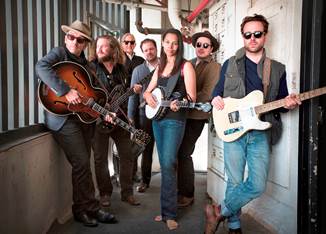 Nearly half a century after someone dashed them away, like most folks do in their basement, a few boxes of unrecorded handwritten lyrics of Bob Dylan from the “Basement Tapes” era were discovered last year. Instead of shipping them out to historians or auction houses, they were given to contemporary musicians, who were invited to finish the potential songs with their own melodies in the manner that Wilco and Billy Bragg did with the works of Woody Guthrie in the “Mermaid Avenue” series of recordings.
Nearly half a century after someone dashed them away, like most folks do in their basement, a few boxes of unrecorded handwritten lyrics of Bob Dylan from the “Basement Tapes” era were discovered last year. Instead of shipping them out to historians or auction houses, they were given to contemporary musicians, who were invited to finish the potential songs with their own melodies in the manner that Wilco and Billy Bragg did with the works of Woody Guthrie in the “Mermaid Avenue” series of recordings.
The efforts of that group — Elvis Costello, Marcus Mumford of Mumford & Sons, Jim James of My Morning Jacket, Rhiannon Giddens of the Carolina Chocolate Drops and Taylor Goldsmith of Dawes — come out on an album this fall produced by T-Bone Burnett, “Lost Songs: The Basement Tapes Continued.”
Coinciding with it is a documentary of the same name chronicling the process directed by Sam Jones and using Dylan’s own voice as narrator that premieres on Showtime Nov. 21.
Showtime president David Nevins said the film will explore “the making of ‘The Basement Tapes’ and their continuing legacy in pop culture.”
The tapes, made in a number of homes near Dylan’s house in Woodstock, including a now famous pink house near West Saugerties, N.Y., with The Band, represented a whirlwind of creativity done after Dylan dropped out of sight following a motorcycle accident the previous year.
“It’s kind of an amazing story,” Nevins told writers at the TV Critics Association summer press tour in Beverly Hills this month. With Dylan, at 27, “at the height of his powers,” churning out songs in the house near Woodstock. The leaking out of the recordings led to “the beginning of the whole bootleg industry,” he says. And the shadowy “Great White Wonder,” as it was known in its most widely known title, “became the best selling bootleg album of all time.”
And an aura built around Woodstock that “led to the hippie invasion of Woodstock.”
A commercial version of “The Basement Tapes” finally was issued by Columbia Records in 1975.
Its best known songs range from “Tears of Rage,” “This Wheel’s on Fire” and “You Ain’t Goin’ Nowhere” to the throw offs, “Please, Mrs. Henry” and “Million Dollar Bash.”
But the Showtime film will show how many more songs there could have been.
“He apparently wrote a lot more songs than ever actually got recorded,” Nevins said. “He had forgotten about it. I’m not sure exactly. But he found the box at the beginning of the year in January, and he gave them to his friend T Bone and he said, ‘…I don’t want to make these songs myself, but if you want to go and put together a group of people to make the songs, you can do it.’”
The film culminates with the recordings done at the Capitol Studios in Hollywood.
The biggest question with the project is why Dylan, unlike Guthrie, alive and capable of finishing his own songs with melodies if he wanted, chose not to. But, Burnett told me at an awards show last weekend, “He once famously said, ‘Don’t look back.’”
Burnett, who was part of the group from HBO’s “True Detective” winning an award for outstanding drama at the TV Critics Associations Awards, told me at the reception afterward that Dylan made it easy for the contemporary musicians to finish the songs because the trove of material “proved Bob is a lyricist, not a poet.” Had they been poems that they had found, they would have been much more difficult to put to music. But his unfinished material had inherent rhythms that made fitting tunes to hem easier, Burnett said.
Burnett also said there was so much material found that they warrant a volume two and possibly volume three of recordings, possibly with a different set of musicians involved.
Dylan’s own participation with the film came in doing off-screen narration for “Lost Songs: The Basement Tapes Continued,” Burnett said. Like the Rolling Stones, who narrated their own bio film “Crossfire Hurricane” for HBO, there was thought that the septuagenarian version of the rock figure was too much at odds with the one from 1967.
“Lost Songs: The Basement Tapes Continued” premieres Nov. 21 at 9 p.m. on Showtime.